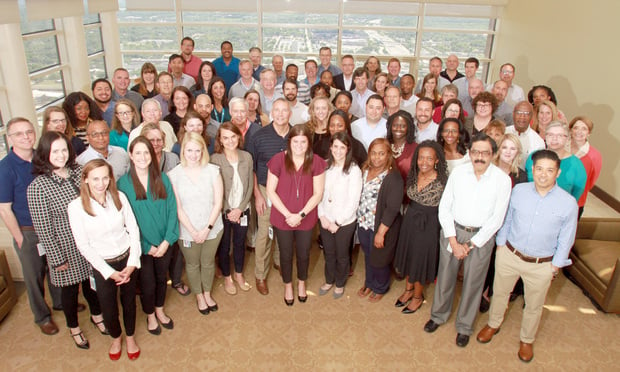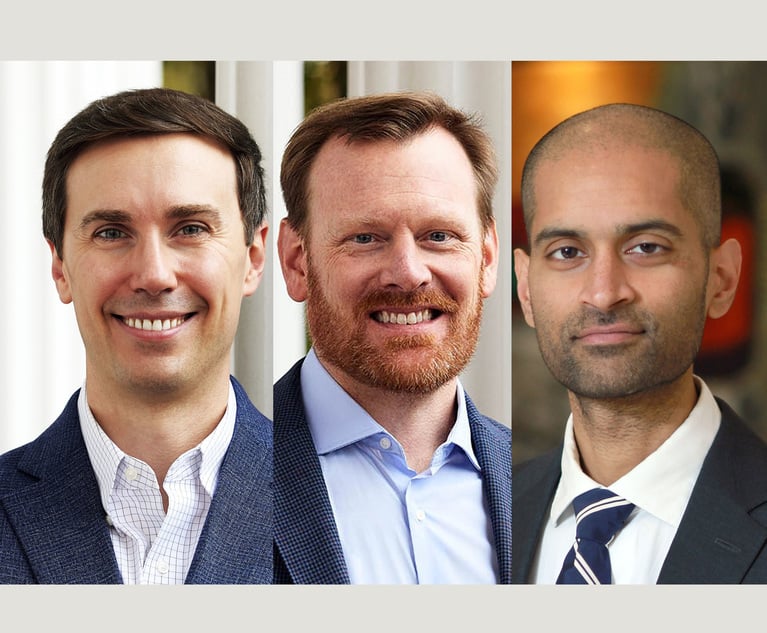In-House Legal Department of the Year: Georgia-Pacific
"Continuing to settle these cases simply invites more cases; indeed, GP was still in the process of settling the last round of containerboard antitrust lawsuits when the alleged conspiracy in this case (known as Kleen) was alleged to have begun."
June 19, 2019 at 02:00 PM
7 minute read
 Georgia-Pacific legal department. Atlanta (Photo: John Disney/ALM)
Georgia-Pacific legal department. Atlanta (Photo: John Disney/ALM)
In 2018, Georgia-Pacific won the final round of a case that could have cost it $11 billion. If that weren't enough to consider the company for an In-House Legal Department of the Year award, an outside counsel to the company had this to say about the company's labor and employment team: “Without exaggeration, nobody manages, understands or navigates complex L&E issues more adeptly than the GP team.”
Tye Darland, Georgia-Pacific's senior vice president and general counsel, leads a legal team that last year consisted of 112 people, including 54 attorneys, 37 paralegals/paraprofessionals and 21 other personnel. The department is organized by business and capability areas, with business attorneys assigned to each of the company's three major business units—consumer products, building products and packaging and cellulose. In addition, attorneys are assigned to eight different capability areas: mergers and acquisitions/real estate; litigation; patent; trademarks; employment/labor/benefits; procurement; investigations/safety/compliance; and environmental.
Here are Darland's responses to the Daily Report's questions.
This department's labor and employment team received particular attention in the nomination. What are the biggest challenges in this area—new regulations or precedents, economic trends or other factors?
Georgia-Pacific is keenly focused on compliance. Having nearly 35,000 employees in approximately 75% of the United States, we work to ensure continuous HR compliance with a patchwork of employment-related state and local laws and ordinances that continue to evolve, with no national preemptive framework in sight. From equal pay and minimum wage to paid family leave, guns-in-the-parking-lot and medicinal marijuana, meeting the often-overlapping substantive legal requirements keeps us on our toes. But, when you add in the accompanying administrative notices, record-keeping and reporting obligations, the most diligent HR compliance efforts can be tested.
A good example is the convergence of the Cook County (Illinois) Earned Sick Leave ordinance and the city of Chicago's Paid Sick Leave ordinance. Both became effective on the same day and were similar, but their leave accrual methodology (among other requirements) didn't sync up. Meeting the expectations of both was troublesome until Cook County signaled that it would defer to Chicago requirements for city employers. With these and other “patchwork” issues, we partner closely with our corporate EEO group and business partners to find solutions that not only meet our legal obligations but also work for the business. We expect this trend to continue to bring more complexity and administrative burden to the labor and employment space.
In addition, Georgia-Pacific competes for the best talent in a tight, changing labor market. We are experimenting with and implementing emerging technologies to help us find the best candidates that fit our culture, evaluate them more quickly and hire them before our competitors can. Therefore, we have been evaluating new technologies like recruiting bots, gig platforms, AI and facial expression analysis software, against an outdated legal and regulatory scheme that did not envision what today's workplace could look like. As a result, a primary challenge for us and other labor and employment law teams is to manage this tension between today's new reality and a labor and employment legal framework that has not progressed on pace with current business demands and technologies.
Georgia-Pacific won a huge victory in the Seventh Circuit in 2018, when the court upheld a dismissal of industrywide price-fixing allegations that could have left the company exposed to $11 billion in damages. The company fought the allegations when another defendant settled for $354 million. Given how companies routinely settle claims, often admitting no wrongdoing, what factors led the legal department to pursue the course that led to this victory?
For decades, since we are in some businesses where there are few competitors, Georgia-Pacific has faced antitrust class actions alleging price-fixing conspiracies. Historically, we and the other defendants would settle these lawsuits, as joint and several liability coupled with treble damages make for very daunting downsides if you try and lose these cases. However, continuing to settle these cases simply invites more cases; indeed, GP was still in the process of settling the last round of containerboard antitrust lawsuits when the alleged conspiracy in this case (known as Kleen) was alleged to have begun. Continuing this pattern would mean GP and others would be forced to pay a recurring litigation tax on a product that is integral to the modern economy (corrugated products are in high demand with the growth of e-commerce).
Georgia-Pacific pursued the Kleen case to judgment because we had to change the pattern of settling these cases due to the enormous downside risks, even though, once again, GP had not conspired with its competitors to fix prices or reduce output. For most of the alleged conspiracy period, GP was running its mills at 100% operating rates. To be certain, GP's price increases usually came at around the same time and were often in the same amounts as those of its competitors in a way that looked like follow-the-leader. But as the district court held in granting summary judgment, “such conduct is lawful,” and 6 of 15 attempted price increases during the alleged “conspiracy” failed precisely because the industry had agreed on nothing.
As the Seventh Circuit noted in affirming the district court's decision, Georgia-Pacific “decided to fight. They persuaded the district court that there was not enough evidence of a conspiracy to proceed to trial.” As the first of our company's Guiding Principles states, acting with integrity takes courage. And in this case, courage paid off.
Our Guiding Principles guide everything we do and are part of our Market Based Management business philosophy—it's a framework that we apply to innovate, improve and transform.
What is the legal department's role in guiding business clients through environmental regulations that accompany production of tissue, pulp, paper, packaging, building products and related chemicals?
We view our role as being a valued partner who can provide forward thinking, practical legal advice to our businesses based on our Guiding Principles. To that end, we are constantly monitoring and analyzing new and proposed environmental, health and safety laws and regulations with our business and technical counterparties at Georgia-Pacific and advising them on the possible implications.
We then work with our businesses to identify, develop and implement strategies to ensure full compliance with those requirements. We get involved early and are actively involved in projects for the acquisition and divestiture of businesses and real estate, both large and small, and use our experience to identify and mitigate real and potential environmental, health and safety risks associated with those transactions.
We also work closely with our compliance, auditing, permitting and remediation teams to ensure that we operate in a safe, legal and responsible manner at all of our locations and strive not just for compliance but environmental excellence. We have the benefit of working with some of the best environmental professionals in the business, both at our facilities and in Atlanta, and the added benefit of full support of our management in all that we do as environmental stewards. Our environmental legal team consists of four lawyers and a paralegal and has well over 100 years of environmental experience and expertise in almost all aspects of environmental, health and safety law. We strive to manage all of the environmental, health and safety legal work in-house, but when necessary we have access to a core group of outside counsel across the United States and Canada with whom we work in close collaboration.
This content has been archived. It is available through our partners, LexisNexis® and Bloomberg Law.
To view this content, please continue to their sites.
Not a Lexis Subscriber?
Subscribe Now
Not a Bloomberg Law Subscriber?
Subscribe Now
NOT FOR REPRINT
© 2025 ALM Global, LLC, All Rights Reserved. Request academic re-use from www.copyright.com. All other uses, submit a request to [email protected]. For more information visit Asset & Logo Licensing.
You Might Like
View All
Spalding Jurors Return $12M Verdict Against State Farm Insurance Client
10 minute read

Trending Stories
- 1'It's Not Going to Be Pretty': PayPal, Capital One Face Novel Class Actions Over 'Poaching' Commissions Owed Influencers
- 211th Circuit Rejects Trump's Emergency Request as DOJ Prepares to Release Special Counsel's Final Report
- 3Supreme Court Takes Up Challenge to ACA Task Force
- 4'Tragedy of Unspeakable Proportions:' Could Edison, DWP, Face Lawsuits Over LA Wildfires?
- 5Meta Pulls Plug on DEI Programs
Who Got The Work
Michael G. Bongiorno, Andrew Scott Dulberg and Elizabeth E. Driscoll from Wilmer Cutler Pickering Hale and Dorr have stepped in to represent Symbotic Inc., an A.I.-enabled technology platform that focuses on increasing supply chain efficiency, and other defendants in a pending shareholder derivative lawsuit. The case, filed Oct. 2 in Massachusetts District Court by the Brown Law Firm on behalf of Stephen Austen, accuses certain officers and directors of misleading investors in regard to Symbotic's potential for margin growth by failing to disclose that the company was not equipped to timely deploy its systems or manage expenses through project delays. The case, assigned to U.S. District Judge Nathaniel M. Gorton, is 1:24-cv-12522, Austen v. Cohen et al.
Who Got The Work
Edmund Polubinski and Marie Killmond of Davis Polk & Wardwell have entered appearances for data platform software development company MongoDB and other defendants in a pending shareholder derivative lawsuit. The action, filed Oct. 7 in New York Southern District Court by the Brown Law Firm, accuses the company's directors and/or officers of falsely expressing confidence in the company’s restructuring of its sales incentive plan and downplaying the severity of decreases in its upfront commitments. The case is 1:24-cv-07594, Roy v. Ittycheria et al.
Who Got The Work
Amy O. Bruchs and Kurt F. Ellison of Michael Best & Friedrich have entered appearances for Epic Systems Corp. in a pending employment discrimination lawsuit. The suit was filed Sept. 7 in Wisconsin Western District Court by Levine Eisberner LLC and Siri & Glimstad on behalf of a project manager who claims that he was wrongfully terminated after applying for a religious exemption to the defendant's COVID-19 vaccine mandate. The case, assigned to U.S. Magistrate Judge Anita Marie Boor, is 3:24-cv-00630, Secker, Nathan v. Epic Systems Corporation.
Who Got The Work
David X. Sullivan, Thomas J. Finn and Gregory A. Hall from McCarter & English have entered appearances for Sunrun Installation Services in a pending civil rights lawsuit. The complaint was filed Sept. 4 in Connecticut District Court by attorney Robert M. Berke on behalf of former employee George Edward Steins, who was arrested and charged with employing an unregistered home improvement salesperson. The complaint alleges that had Sunrun informed the Connecticut Department of Consumer Protection that the plaintiff's employment had ended in 2017 and that he no longer held Sunrun's home improvement contractor license, he would not have been hit with charges, which were dismissed in May 2024. The case, assigned to U.S. District Judge Jeffrey A. Meyer, is 3:24-cv-01423, Steins v. Sunrun, Inc. et al.
Who Got The Work
Greenberg Traurig shareholder Joshua L. Raskin has entered an appearance for boohoo.com UK Ltd. in a pending patent infringement lawsuit. The suit, filed Sept. 3 in Texas Eastern District Court by Rozier Hardt McDonough on behalf of Alto Dynamics, asserts five patents related to an online shopping platform. The case, assigned to U.S. District Judge Rodney Gilstrap, is 2:24-cv-00719, Alto Dynamics, LLC v. boohoo.com UK Limited.
Featured Firms
Law Offices of Gary Martin Hays & Associates, P.C.
(470) 294-1674
Law Offices of Mark E. Salomone
(857) 444-6468
Smith & Hassler
(713) 739-1250







